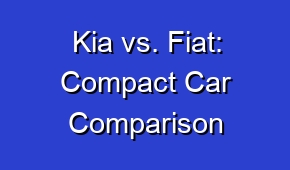Car Tuning

Car tuning is the process of modifying a vehicle to enhance its performance, appearance, and handling. It involves making modifications to the engine, suspension, exhaust, and aesthetics, resulting in a personalized and customized car.
Car tuning is a popular way to enhance the performance and appearance of a vehicle. With the right modifications, you can unleash the full potential of your car. From upgrading the engine and exhaust system to installing suspension and brake enhancements, there are endless possibilities for customization. Performance chips can optimize your engine’s power and fuel efficiency, while body kits and aerodynamic improvements can give your car a sleek and aggressive look. Whether you’re a racing enthusiast or simply want to stand out on the road, car tuning offers a range of options to suit your preferences. Remember to consult with a professional to ensure proper installation and performance.
| Car tuning enhances performance and improves the overall driving experience. |
| Engine remapping can optimize power and torque output in a car. |
| Aftermarket exhaust systems offer better sound and increased horsepower. |
| Suspension upgrades can improve handling and provide a sportier feel. |
| Performance air filters allow more airflow, resulting in increased engine power. |
- Car tuning can be done through modifications like chip tuning, turbocharging, and supercharging.
- Upgraded brake systems can improve stopping power and reduce braking distance.
- Custom body kits enhance the aesthetics and aerodynamics of a car.
- High-performance tires provide better traction and grip for improved handling.
- Performance intake systems increase air intake for more power and better throttle response.
What is car tuning and why is it important?
Car tuning is the process of modifying a vehicle to improve its performance, appearance, or both. It involves making changes to the engine, suspension, exhaust system, and other components. Car tuning is important because it allows car owners to personalize their vehicles and enhance their driving experience.
How does car tuning improve engine performance?
Car tuning can improve engine performance by optimizing the air-fuel ratio, increasing horsepower and torque, and reducing turbo lag. This is achieved through modifications such as installing a performance air intake, upgrading the exhaust system, and remapping the engine control unit (ECU).
What are the different types of car tuning?
There are various types of car tuning, including engine tuning, suspension tuning, brake tuning, and aesthetic tuning. Engine tuning focuses on enhancing the performance of the engine, while suspension tuning improves handling and ride comfort. Brake tuning involves upgrading the braking system for better stopping power, and aesthetic tuning involves modifying the appearance of the vehicle.
Is car tuning legal?
Car tuning is generally legal as long as it complies with local regulations and emissions standards. However, some modifications may be subject to restrictions or require certification. It is important to check the laws and regulations in your area before making any modifications to your vehicle.
Can car tuning void the warranty?
Modifying your car through tuning can potentially void the warranty, as it involves altering the original specifications set by the manufacturer. It is advisable to consult with the manufacturer or dealership to understand the impact of car tuning on the warranty before making any modifications.
What are the risks of car tuning?
Car tuning can pose certain risks, such as engine damage, increased fuel consumption, and decreased reliability. Improper tuning or installation of aftermarket parts can lead to mechanical failures or voiding the warranty. It is important to work with reputable tuners and choose high-quality components to minimize these risks.
How much does car tuning cost?
The cost of car tuning varies depending on the type and extent of modifications. Basic tuning options like a performance air intake or exhaust system can range from a few hundred to a few thousand dollars. Extensive engine modifications or professional tuning services can cost several thousand dollars or more.
Can car tuning improve fuel efficiency?
Car tuning can potentially improve fuel efficiency by optimizing the engine’s performance and making it more efficient. By adjusting the air-fuel mixture and reducing restrictions in the intake and exhaust systems, fuel consumption can be optimized. However, the extent of fuel efficiency improvement may vary depending on the specific modifications and driving conditions.
Are there any downsides to car tuning?
Car tuning may have some downsides, such as increased maintenance requirements, decreased reliability, and potential legal issues if modifications do not comply with regulations. It is important to weigh the benefits against the potential drawbacks and make informed decisions when considering car tuning.
What are the legal requirements for car tuning?
The legal requirements for car tuning vary by country and region. It is important to check local laws and regulations regarding modifications to ensure compliance with safety, emissions, and noise regulations. Some countries may require certification or approval for certain modifications.
Can car tuning improve acceleration?
Yes, car tuning can improve acceleration by increasing horsepower and torque, optimizing gear ratios, and reducing weight. This can be achieved through modifications such as engine tuning, upgrading the transmission, and installing lightweight components. However, the extent of improvement may depend on the specific modifications and the vehicle’s original performance.
What are the popular car tuning trends?
Popular car tuning trends include engine remapping, performance exhaust systems, suspension lowering, and aesthetic modifications such as body kits and custom paintwork. Tuning for electric vehicles, hybrid systems, and eco-friendly modifications are also gaining popularity.
Can car tuning improve top speed?
Car tuning can potentially improve the top speed of a vehicle by increasing engine power, reducing aerodynamic drag, and optimizing gear ratios. Modifications such as engine tuning, aerodynamic enhancements, and upgrading the transmission can contribute to achieving higher top speeds.
How does car tuning affect emissions?
Car tuning can have both positive and negative effects on emissions. Some modifications, such as upgrading the exhaust system, can improve exhaust flow and reduce emissions. However, certain engine modifications may result in increased emissions, especially if not properly tuned or if emissions control systems are bypassed.
Can car tuning improve handling?
Yes, car tuning can improve handling by upgrading suspension components, optimizing the vehicle’s weight distribution, and installing performance tires. Lowering the vehicle’s center of gravity and improving grip can enhance cornering ability and overall stability.
What are the benefits of aesthetic car tuning?
Aesthetic car tuning allows car owners to personalize their vehicles and make them stand out. It can include modifications such as custom paintwork, body kits, alloy wheels, and interior enhancements. Aesthetic tuning can enhance the overall appearance and visual appeal of a car.
How does car tuning affect insurance?
Car tuning can potentially affect insurance premiums, as modified vehicles may be considered higher risk by insurance companies. It is important to notify your insurance provider about any modifications and ensure that they are covered. Failure to disclose modifications may result in denied claims or policy cancellation.
Can car tuning be reversed?
Yes, car tuning modifications can often be reversed by removing or replacing the aftermarket parts. However, some modifications, such as engine remapping or modifications that alter the vehicle’s structure, may be more difficult or costly to reverse. It is important to consider the reversibility of modifications before making any changes.
How can I find a reputable car tuning service?
To find a reputable car tuning service, you can ask for recommendations from car enthusiasts, check online reviews and ratings, and inquire about the experience and qualifications of the tuners. It is important to choose a service provider with a good reputation and experience in the specific type of tuning you require.





















